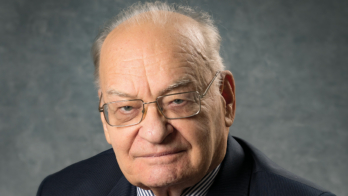The laboratory takes on the challenges of the coming years.
Résumé
La nouvelle Direction du CERN entame un mandat de cinq ans
Plusieurs défis attendent le CERN entre 2016 et 2020. L’arrêt technique hivernal des accélérateurs se terminant fin mars, l’étude de la physique de l’après-Higgs va pouvoir commencer au LHC. Parallèlement, les autres accélérateurs et expériences vont permettre au Laboratoire de conserver un programme scientifique diversifié et passionnant. Pour le CERN, cela voudra dire maintenir le cap sur les plans technique et financier pour le projet HL-LHC et les améliorations des injecteurs, aussi bien pour les accélérateurs que pour les expériences. Le vaste programme de collaboration avec la communauté scientifique mondiale sera enrichi grâce à des études et des projets comme l’étude FCC, le CLIC et AWAKE. Le CERN contribuera aussi à la recherche sur les neutrinos en dehors de l’Europe grâce à la “plateforme neutrino”. Selon la Directrice générale du CERN, ces années seront décisives pour “commencer à bâtir l’avenir à long terme de la physique des particules”.
Several challenges lie ahead for CERN during the years 2016–2020. With the winter technical stop of the accelerators coming to an end in March, the voyage of true post-Higgs physics exploration can start at the LHC. In the meantime, all of the other accelerators and experiments will continue to ensure that the scientific programme of the laboratory remains as diverse and compelling as it has always been.
For CERN, this means ensuring that the High-Luminosity LHC project and injector upgrades remain technically on track and financially secure, for both the accelerators and the experiments.
The rich programme of collaboration with the worldwide scientific community will be enhanced through studies and projects like the FCC study, CLIC and AWAKE. Beyond the lab, CERN will contribute to neutrino research outside of Europe through the CERN neutrino platform.
In the words of the Director-General, these years will be crucial “to start building the long-term future of particle physics”.
Fabiola Gianotti – Director-General
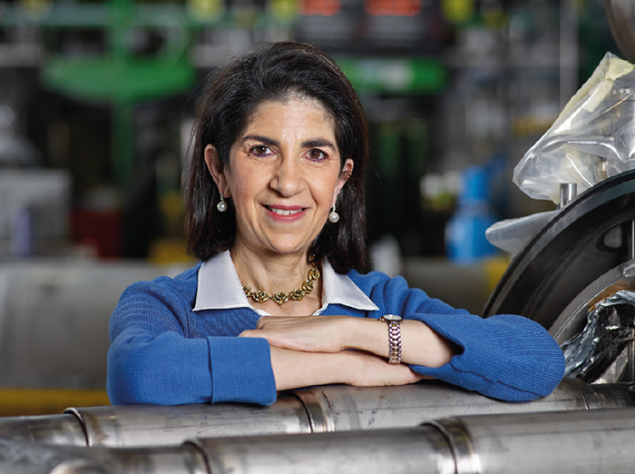
Image credit: CERN.
In 1989, Fabiola Gianotti was awarded a PhD in experimental particle physics from the University of Milan, and went on to become an eminent physicist with more than 500 authored or co-authored publications in peer-reviewed scientific journals.
Gianotti has been a research physicist in the Physics Department of CERN since 1994 – when she joined as a fellow – and since then has been involved in several CERN experiments, detector R&D and construction, as well as software development and data analysis.
From 2009 to 2013, she held the elected position of spokesperson for the ATLAS experiment, and was honoured to announce the discovery of the Higgs boson in a seminar at CERN on 4 July 2012.
During her career she has also been a member of several international committees, such as the Scientific Council of the CNRS (France), the Physics Advisory Committee of the Fermilab Laboratory (USA), the Council of the European Physical Society, the Scientific Council of the DESY Laboratory (Germany), and the Scientific Advisory Committee of NIKHEF (Netherlands). She is also a member of the Scientific Advisory Board of the UN secretary-general, Mr Ban Ki-moon, and of both the US National and the Italian Academy of Sciences (Accademia Nazionale dei Lincei).
Since 2012, Gianotti has been bestowed with several awards, including the Special Fundamental Physics Prize of the Milner Foundation (2012), the Enrico Fermi Prize of the Italian Physical Society (2013) and the Medal of Honour of the Niels Bohr Institute of Copenhagen (2013). She was also awarded the honour of “Cavaliere di Gran Croce dell’ordine al merito della Repubblica” by the Italian President.
Gianotti’s influence and success have also led to her being ranked 5th in Time magazine’s “Personality of the Year 2012”, included in the Guardian’s 2011 “Top 100 most inspirational women” and Forbes magazine’s 2013 “Top 100 most inspirational women” lists, and is considered one of the “Leading Global Thinkers of 2013” by Foreign Policy magazine (USA, 2013).
On 1 January, she became the first female Director-General of CERN.
Frédérick Bordry – Director for Accelerators and Technology
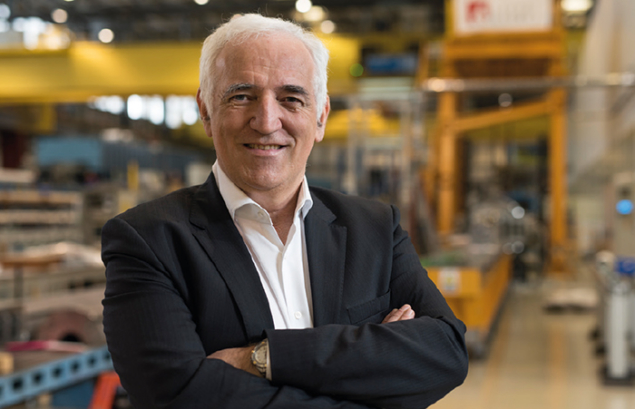
Image credit: CERN.
In 1978, Frédérick Bordry graduated with a PhD in electrical engineering from the Institut National Polytechnique in Toulouse, and went on to gain his higher doctorate in science from the same institute in 1985.
Bordry’s early career was spent teaching and conducting energy conversion research. Then he moved to Brazil, where he spent two years as a professor at the Federal University of Santa Catarina (Florianópolis). In 1981, he was appointed senior lecturer at the Institut National Polytechnique in Toulouse.
Bordry came to CERN in 1986, joining the group working on power converters for the Large Electron–Positron Collider (LEP), before moving in 1988 to the Operations Group as an engineer in charge of the Super Proton Synchrotron and LEP.
In 1994, the year that the LHC was approved, he joined the Power Converter Group as the head of power converters design and construction for the LHC. He was appointed leader of the Power Converter Group in 2002, a position he held until December 2008.
In 2009, Bordry was promoted to head of the CERN Technology Department – responsible for technologies specific to existing particle accelerators, facilities and future projects – where he has remained until 2013.
From 2014, he acted as the director for accelerators and technology, where he is responsible for the operation and exploitation of the whole CERN accelerator complex, with particular emphasis on the LHC and for the development of new projects and technologies. He was re-appointed CERN’s Director for Accelerators and Technology.
Eckhard Elsen – Director for Research and Computing

Image credit: CERN.
Eckhard Elsen obtained his PhD in particle physics from Hamburg University in 1981.
Elsen’s research focused initially on e+e– collider particle physics and led him to prominent postdoctoral positions at Hamburg University, SLAC National Accelerator Laboratory, and Heidelberg University, where he first made contact with CERN as a member of the OPAL collaboration.
In 1990, Elsen was promoted to senior scientist for the Deutsches Elektronen-Synchrotron (DESY), in Germany. During this time, he became the spokesperson for the H1 experiment (an international collaboration that developed and built the H1 detector at the ep-collider HERA at DESY), and later – after a sabbatical at the BaBar experiment at Stanford – project manager for the International Linear Collider (ILC) project team at DESY, when Elsen continued his relationship with CERN.
In 2006, Elsen was made a professor at Hamburg University, where he taught both general physics courses and accelerator physics, and supervised students.
Elsen has co-authored two books (the most recent on the physics harvest of the LHC Run 1), worked on more than 450 publications in various fields of particle physics, and participated in many scientific committees – including chairing the LHC experiments committee from 2011 to 2014.
Martin Steinacher – Director for Finance and Human Resources
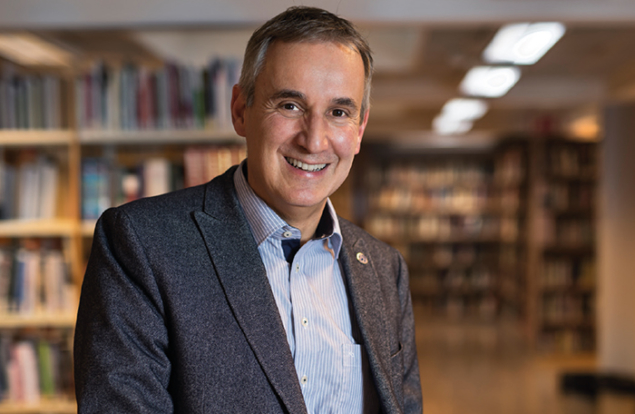
Image credit: CERN.
Martin Steinacher studied physics, mathematics and astronomy before going on to gain his doctorate in experimental physics at the University of Basel.
After completing his studies, Steinacher moved to the University of Berne, where he worked for seven years as a scientific collaborator on space-research projects.
Then he continued as a civil servant at the Foreign Ministry, where he acted as a delegate for Switzerland and was responsible for planning the Swiss financial contribution to the European Space Agency (ESA), European Southern Observatory (ESO) and other international organisations.
These skills led to Steinacher being appointed the scientific adviser for the Federal Office for Education and Science, before being appointed the deputy head of international co-operation at the State Secretariat for Education and Research.
In his role as chairman of the CERN Finance Committee, Steinacher worked closely with CERN member states, which led to the unanimous approval of a new method to calculate the annual scale of contribution.
In 2013, Steinacher was promoted to head of the International Research Organisations Unit, giving him high-level roles as senior scientific administrator in the ESO and ESRF Councils. His achievements while in this position include helping to negotiate Poland’s accession to ESO and also securing a funding agreement for the Swiss participation in the European Spallation Source project, until 2026.
Charlotte Lindberg Warakaulle – Director for International Relations
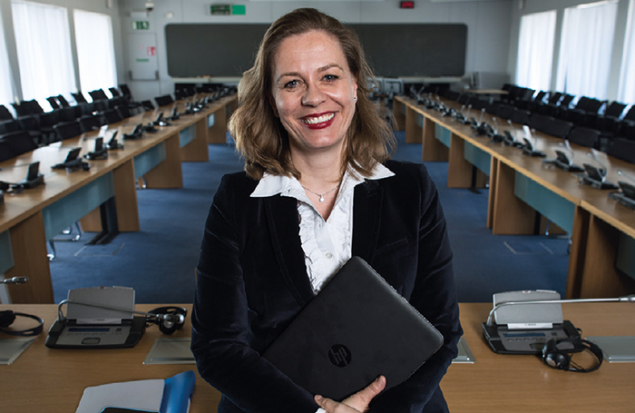
Image credit: CERN.
Since 2001, Charlotte Warakaulle has held a variety of posts at the United Nations, from associate speechwriter to chief of the Political Affairs and Partnerships Section of the United Nations Office at Geneva.
During her time in this post, she was a key focal point for relations between CERN and the United Nations Office at Geneva, and was closely involved in the first-ever UNOG-CERN Co-operation Agreement, signed in 2011.
She was also a linchpin in the preparations for CERN obtaining observer
status with the General Assembly at the United Nations in 2012.
Most recently, she took on the position of chief of the United Nations Library in Geneva, where she was responsible for library services, knowledge management, cultural diplomacy and intellectual outreach.
Prior to her work with the United Nations, Warakaulle held a Carlsberg visiting research fellowship at Lucy Cavendish College at the University of Cambridge from 1998 to 2001.
During her time at the University of Cambridge, she also served as editor-in-chief of the Cambridge Review of International Affairs, a peer-reviewed international affairs journal then published by the Centre of International Studies at the University of Cambridge.
She gained her MPhil in international relations at the University of Cambridge (Pembroke College), and also holds an MA in history (cand.mag.) from the University of Copenhagen, as well as an MA in history (coursework) from the University of Sydney and a BA in history from the University of Copenhagen.



